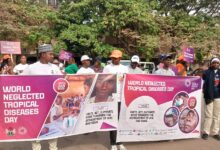Covid-19: WHO Charges Countries To Step Up Surveillance

The World Health Organisation (WHO) has charged African countries to step up surveillance, because without genomic information, variants could spread undetected.
Dr. Matshidiso Moeti, WHO Regional Director for Africa made the call yesterday at a virtual press briefing on the covid-19 pandemic said:
“You can’t fix what you don’t measure.”
TheFact Nigeria noted that weekly covid-19 cases in Africa fell by more than 20% due to increased awareness campaigns.
According to Dr. Moeti, the continent of Africa lagged far behind the rest of the world when it came to sequencing, with only 1% of over 3 million COVID-19 sequences conducted worldwide occurring in Africa.
She cited that in Southern Africa, more than 4000 COVID-19 genome sequencing data was produced in August and the Delta variant was detected in over 70% of samples from Botswana, Malawi and South Africa, and in over 90% from Zimbabwe.
Dr. Moeti therefore stressed the need for countries to step up surveillance because without genomic information, variants could spread undetected, she said:
“While COVID-19 cases have declined appreciably, the downward trend is frustratingly slow due to the lingering effects of the more infectious Delta variant.
“We are spearheading critical work and supporting countries in scaling up pathogen surveillance through genome sequencing to detect and respond effectively to COVID-19 variants”, she said.
The WHO Africa regional director hinted that the C.1.2 variant initially identified in South Africa had so far been detected in 130 cases in 10 countries globally, including five in Africa.
She disclosed that WHO, in collaboration with the South African National Bioinformatics Institute was making efforts to set up the Regional Centre of Excellence for Genomic Surveillance and Bioinformatics in Cape Town.
The centre, she said will support 14 countries before being expanded to serve more countries. Last year, WHO and partners established a COVID-19 sequencing laboratory network in Africa which has to date produced nearly 40 000 sequencing data.
She however noted that to conquer the pandemic, vaccinations should be stepped up:
“As Africa’s third COVID-19 pandemic wave eases off, vaccine shipments to the continent continue to grow, with around 5.5 million doses received through COVAX in the first week of September. However, only around 3% of the continent’s population is fully vaccinated.
“To ultimately tip the scales against this pandemic, our best efforts to reduce transmission through public health measures must be met by a significant step-up in vaccine supplies and vaccinations,” Dr. Moeti said.
Weekly COVID-19 cases in Africa fell by more than 20%—the sharpest seven-day decline in two months – as the third wave pandemic tapers off.
The continent recorded more than 165 000 cases in the week ending on 5 September—23% lower than the week before, yet still higher than the weekly cases recorded at the peak of the first wave.
Other speakers at the press briefing included; Professor Alan Christoffels, Director of the South African National Bioinformatics Institute, and Dr.Christian Happi, Professor of Molecular Biology and Genomics and Director at the African Centre of Excellence for Genomics of Infectious Diseases at Redeemer’s University in Nigeria.






